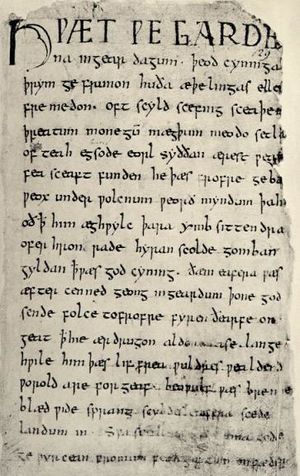|
HWÆT, WE GAR-DEna in geardagum,
þeodcyninga þrym gefrunon,
hu ða æþelingas ellen fremedon!
oft Scyld Scefing sceaþena þreatum,
monegum mægþum meodosetla ofteah,
egsode eorlas, syððanærest wearð
feasceaft funden; he þæs frofre gebad,
weox under wolcnum weorðmyndum þah,
oð þæt him æghwylc ymbsittendra
ofer hronrade hyran scolde,
gomban gyldan; þæt wæs god cyning!
Ðæm eafera wæs æfter cenned
geong in geardum, þone God sende
folce to frofre; fyrenðearfe ongeat,
þe hie ær drugon aldorlease
lange hwile; him þæs Liffrea,
wuldres Wealdend woroldare forgeaf,
Beowulf wæs breme --- blæd wide sprang---
Scyldes eafera Scedelandum in.
Swa sceal geong guma gode gewyrcean,
fromum feohgiftumon fæder bearme,
þæt hine on ylde eft gewunigen
wilgesiþas, þonne wig cume,
leode gelæsten; lofdædum sceal
in mægþa gehwære man geþeon.
|
LO, praise of the prowess of people-kings
of spear-armed Danes, in days long sped,
we have heard, and what honor the athelings won!
Oft Scyld the Scefing from squadroned foes,
from many a tribe, the mead-bench tore,
awing the earls. Since erst he lay
friendless, a foundling, fate repaid him:
for he waxed under welkin, in wealth he throve,
till before him the folk, both far and near,
who house by the whale-path, heard his mandate,
gave him gifts: a good king he!
To him an heir was afterward born,
a son in his halls, whom heaven sent
to favor the folk, feeling their woe
that erst they had lacked an earl for leader
so long a while; the Lord endowed him,
the Wielder of Wonder, with world's renown.
Famed was this Beowulf: far flew the boast of him,
son of Scyld, in the Scandian lands.
So becomes it a youth to quit him well
with his father's friends, by fee and gift,
that to aid him, aged, in after days,
come warriors willing, should war draw nigh,
liegemen loyal: by lauded deeds
shall an earl have honor in every clan.
|
